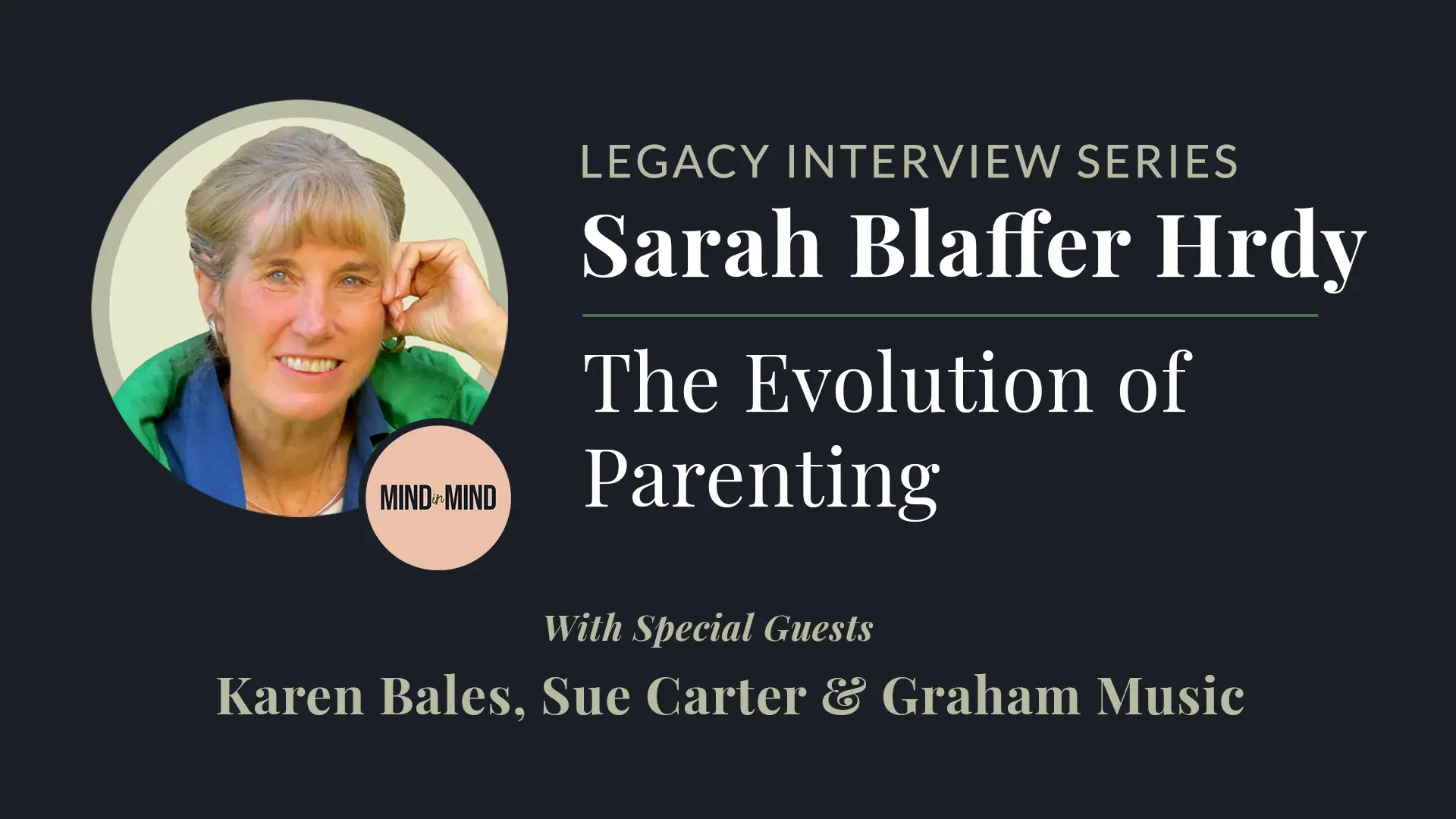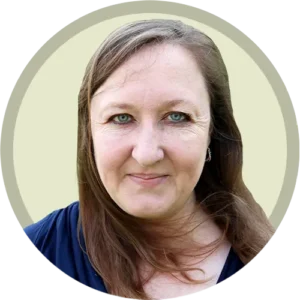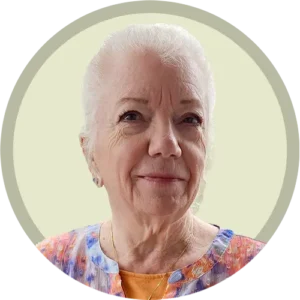June 2025
Stephen Porges and Sue Carter Live Legacy Interview
Stephen Porges and Sue Carter Live Legacy Interview
Join us for a special Live Legacy Interview exploring the life and work of Dr Stephen Porg...

– Watch the full recording for £39 includes a 2 hour CEU/CPD certificate –
“I would like to thank all the speakers for sharing their knowledge. Also for them to know that they have all influenced my work with children and families where the child has additional developmental needs, especially in ensuring mothers AND fathers are included in and supported in their parenting occupations. Thank you all for helping me to see so much more.” – Lindsay Hardy, Attendee
As Professor Emerita of the Department of Anthropology at the University of California, Davis, and an Associate at the Peabody Museum of Archaeology and Ethnology at Harvard University, Sarah’s research has transformed our understanding of human evolution by showing that our species’ unique traits – large brains, complex social abilities and our capacity for cooperation – could only evolve in societies where raising children was a collective effort, with both parents and additional caregivers (‘alloparents’) sharing the responsibilities of nurturing, protecting, and feeding the young.
Sarah’s work gives weight to therapeutic interventions that help families build the social support networks vital for psychological wellbeing and provides new ways of understanding parental ambivalence, postnatal depression, and caregiver burnout.
Her research also validates what many clinicians observe in practice: that maternal ambivalence is generally normal rather than pathological, that fathers are biologically capable of sensitive caregiving, and that children benefit from forming attachments with multiple trusted adults. For example, one of the strongest predictors of a child’s resilience in the face of trauma is the presence of any supportive adult—not necessarily a parent. Postpartum depression occurs less often when women are surrounded by supportive others after birth, and teens navigate the bridge to adulthood more successfully with the help of older mentors.
During this special event, Sarah shared how her personal experience of motherhood has shaped her influential theories on human development – from her early fieldwork studying infanticide in Langur monkeys to balancing academic work and parenting, and observing how different cultures approach childcare.
Sarah Blaffer Hrdy was in conversation with Jane O’Rourke, Child, Adolescent and Family Psychotherapist and former BBC Producer and Journalist.
Sarah’s work has important implications for therapeutic practice, including:
Her work provides an important framework for practitioners, linking core psychoanalytic ideas about human nature with evolutionary perspectives. As Graham Music notes, her approach succeeds in “not sugar-coating the more unsavoury aspects of human nature yet still holding on to the crucial importance of attachment in the context of cooperative caregiving”. This perspective has profound implications for how we structure therapeutic and social services and the training of those of us who work with parents and families.
We were also delighted to be able to discuss Sarah’s latest book, ‘Father Time: A Natural History of Men and Babies’, (Princeton University Press, 2024). This work examines the evolution of paternal care in humans, exploring how fathers are biologically transformed when they care for babies.
The Telegraph newspaper says “Sarah Blaffer Hrdy’s new book ‘Father Time’ reminds us that she is one of the most important thinkers in evolutionary biology since Darwin.”
Father Time offers fresh insights into:
– The biological and cultural foundations of paternal care
– The evolution of male nurturing
– The impact of involved fathering on child development
– Cross-cultural variations in paternal involvement
– The implications for modern family life and gender roles

Karen Bales is Professor of Psychology and Neurobiology at UC Davis and Interim Director of the California National Primate Research Centre. Her groundbreaking research on the neurobiology of social bonding and attachment, particularly through studies with prairie voles and titi monkeys, has shown how early experiences shape attachment patterns in humans and parenting behaviours across generations.
As Editor-in-Chief of the American Journal of Primatology and with over 156 peer-reviewed publications, Karen has made significant contributions to understanding Oxytocin’s role in development and social behaviour. Her research has particular relevance for clinicians interested in the neurobiological foundations of relationships and social support. Her research programme at UC Davis continues to receive extensive funding from NIH and other major institutions, focusing on how early experiences influence brain development, social behaviour, parenting styles, and stress responses. This work provides important neurobiological evidence supporting theories about cooperative child rearing and parental investment in human evolution.
Karen says, “Dr. Hrdy’s contribution to the field is her incredible ability to combine the fields of evolution, behaviour, physiology and neurobiology in a way that reaches past all of them to explain what it is to be human…”
 Sue Carter, pioneering neuroscientist and former Director of The Kinsey Institute for Research in Sex, Gender, and Reproduction, has transformed our understanding of social bonds through her extensive research. Her research took a personal turn in 1980 when her first experience of motherhood sparked a deep scientific interest in Oxytocin. Drawing on anthropological research about !Kung hunter-gatherers’ parenting practices, she integrated traditional caregiving approaches with her academic career, using these insights to inform both her parenting and research.
Sue Carter, pioneering neuroscientist and former Director of The Kinsey Institute for Research in Sex, Gender, and Reproduction, has transformed our understanding of social bonds through her extensive research. Her research took a personal turn in 1980 when her first experience of motherhood sparked a deep scientific interest in Oxytocin. Drawing on anthropological research about !Kung hunter-gatherers’ parenting practices, she integrated traditional caregiving approaches with her academic career, using these insights to inform both her parenting and research.
Sue’s work has reshaped our understanding of Oxytocin far beyond its traditional characterisation as a ‘female reproductive hormone’. Her research revealed Oxytocin’s crucial role in social bonding, stress regulation, and emotional wellbeing for both sexes across the lifespan. Her experiences with synthetic Oxytocin (Pitocin) during her own labour led her to question the impact of modern birth interventions on maternal-infant bonding and development. This integration of personal experience with scientific rigour has characterised her approach throughout her career, as she showed how biological mechanisms underpin social connections and wellbeing.
Sue says, “Sarah has examined the full picture surrounding human parenting from multiple perspectives, including evolutionary theory, anthropology, comparative behavioural research, developmental psychology and even includes a bit of carefully chosen physiology (hormones and behaviour). She is capable of making complex science more interesting than almost anyone else I can think of.”
 Graham Music is a Consultant Child and Adolescent Psychotherapist and Adult Psychotherapist and former Associate Clinical Director of the Tavistock Clinic where he pioneered innovative approaches to service delivery and training programmes.
Graham Music is a Consultant Child and Adolescent Psychotherapist and Adult Psychotherapist and former Associate Clinical Director of the Tavistock Clinic where he pioneered innovative approaches to service delivery and training programmes.
His clinical specialty has been understanding and working with trauma and he has established a range of services working with the aftermath of child maltreatment and neglect. His decades of experience researching and working with neglect, abuse and trauma has given him a deep appreciation for how Sarah’s work makes space for both the best and the worst of human nature.
Through his extensive clinical work Graham has seen firsthand how Sarah’s insights into the evolutionary basis of maternal ambivalence and the critical role of social support are reflected in clinical practice. Drawing on her research, Graham has developed therapeutic approaches that emphasise the importance of the social context and social support networks that evolution has primed us for, challenging the idea that mothers are solely responsible for early caregiving.
In the teaching of child development Sarah has also influenced the conception of the role of fathers and he says her research is a powerful challenge to parenting practice, policy and indeed to how western society is organised.
Graham says, “Sarah’s ideas have an important place in the training of therapists, not least in reducing the burden of guilt on mother’s parenting in a world so unlike that in which we evolved. These ideas greatly help us deliver more effective therapeutic work, particularly around issues of maternal mental health, parent-child relationships, and the vital role of wider support networks in psychological wellbeing.”
Watch Graham Music’s Legacy Interview
This Legacy Interview provides a unique opportunity to hear directly from some of the most influential thinkers in human evolutionary biology, with lessons applicable across multiple disciplines. Whether you’re a psychotherapist, mental health professional, social worker, nurse or just broadly interested in human development, this interview is both illuminating and inspiring, focusing on:
– The evolution of human emotional and social capabilities
– Understanding attachment in the context of human evolution
– The role of multiple caregivers in healthy development
– Clinical implications of evolutionary perspectives on maternal and paternal care
– The importance of social support networks in therapeutic work
– Cross-cultural approaches to understanding caregiving
– Integrating evolutionary insights into clinical practice
– Implications for policy and social structure
– Challenges to traditional assumptions about parenting
CPD/CEU: This recording qualifies for 2 hours of Continuing Professional Development/Continuing Education Units. A certificate is included in the price.
Sarah’s influence extends globally, with her innovative research findings influencing fields from evolutionary anthropology to developmental psychology. Her recent receipt of the prestigious Bowlby-Ainsworth Award recognises her crucial role in strengthening attachment theory through evolutionary and cross-cultural perspectives, offering valuable insights for practitioners working with mothers, fathers and children.
Her key works – ‘Mother Nature’, ‘Mothers and Others’, and now ‘Father Time’ – have significantly shaped our understanding of human caregiving. Through these works, she has demonstrated how human evolution required ‘alloparental’ care, showing that our species’ distinctive cognitive and social capabilities could only emerge when mothers had help raising their children.
Sarah lives in Northern California where she and her husband manage Citrona Farms, combining academic work with walnut farming and habitat restoration. Her contributions have been widely recognised through awards including the Lifetime Career Award from the Human Behavior and Evolution Society and the National Academy’s Award for Scientific Reviewing, acknowledging her ability to synthesise research across disciplines to illuminate human social behaviour and development.
Sarah is in conversation with Jane O’Rourke.
Jane O'Rourke – Founder of MINDinMIND and former award-winning BBC journalist turned Child and Adolescent Psychotherapist. Jane brings a unique skill set to create rich and thoughtful conversations, weaving together the personal and professional threads of her guests' journeys.
Details correct at time of recording on 20 November 2024